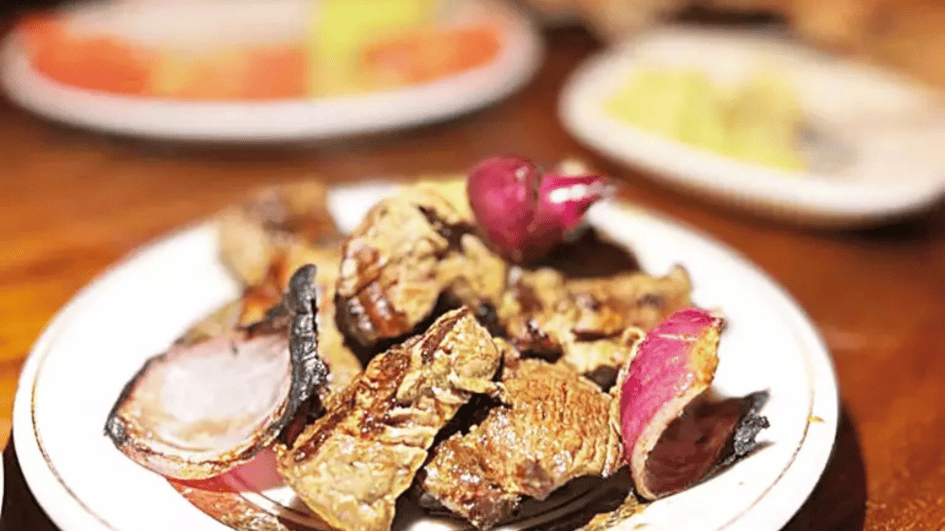
You know those places that we dream of making the Michelin list? One such restaurant is Kasap Fuat (Butcher Fuat) in İzmir, a one-of-a-kind family-run enterprise that concentrates on the essence of flavor with high-quality, locally sourced ingredients and proper cooking techniques. While their meat is good, it’s their unique offal dishes that truly stand out, offering flavors you won’t find anywhere else.
We have no objections to the guide focusing on the most assertive restaurants or chef-driven ones. However, our appreciation grows when a simple diner, tavern, traditional fish restaurant, or small family-run venture makes the list and is rewarded. This indicates a deeper grasp of our culinary traditions, which pleases us. Kasap Fuat, located in Alsancak, İzmir, is a case in point.
From the exterior, one wouldn’t guess it’s a restaurant. The front features a small, well-lit butcher shop, and just beyond, daily appetizers are displayed on a counter to the left. Passing through an intermediate door leads to a completely different world. There, you find a delightful, unpretentious dining area filled with visibly happy people and tasty dishes coming out of the kitchen...
Serhat, the second generation, now runs Kasap Fuat, succeeding his father, Fuat Yelmen. Fuat started working as an apprentice at the age of 14 in the Bozcaada branch of Koca Mustafa, one of the leading cattle-dealers in İzmir. He later honed his skills under a Greek butcher before returning to İzmir. Fuat became renowned in the 1990s for his unique meatballs he made in the butcher section of a supermarket. His reputation grew to the point where Selçuk Yaşar, the owner of Pınar Et, their meat supplier, personally visited to admire Fuat’s meatballs and even offered him a job. Actually, Fuat Yelmen owns the recipes for some of the frozen meatballs that are currently on the market.
In 1996, they opened their butcher shop in Alsancak in a different location on the same street as where they are currently located. Their meatballs, still the top-selling item, may have built their fame, but what makes them truly stand out, in my opinion, is that you won’t find offal this delicious and unique anywhere else. Yes, I am being quite bold when I suggest that every offal you consume here will make you reconsider what you have previously eaten. Take the liver, for instance. Lamb liver is freshly chopped upon ordering because, as Serhat Yelmen explains, “Liver begins to lose its flavor as it sits and releases blood. Here, it takes merely 3-4 minutes from the first cut until it’s served at your table.”
So, what about kokoreç? Yes, you can eat good kokoreç in many restaurants across the Aegean Region, but the uniqueness of the version served here is immediately noticeable to anyone who tries it, indicating a special touch. The family has long leased a farm in Foça, which is the secret to their exceptional flavor. They prepare the kokoreç by filling it with sweetbreads and slow-cooking it in a tandoor for 12 hours at the Foça farm before bringing it to the restaurant. Upon order, it’s briefly grilled to achieve a crispy exterior and tender interior, and the freshness of the ingredients is obvious in every way. The reason why other kokoreç vendors don’t adopt this method, despite its superiority, is the impracticality of such a time-consuming process for high-volume sellers.
Seasoned with wild mountain thyme, sweetbreads are taken from the throat of milk-fed lambs. Sweetbreads, glands located near the throat, liver, or lungs of calves or lambs, are favored when taken from the lamb’s throat. The smoked meat, subtly seasoned and served cold in thin slices, comes from parts of the calf such as the arm and rib, known locally as “güngörmez,” along with veal entrecote. This meat is gently smoked using cherry wood to enhance its flavor.
There is also picanha. It is a cutting style that is not very common in our country, but popular among Argentinians and Brazilians. It is taken from the upper part of the hind leg of the calf, and because it has a layer of fat the size of a finger, it is exceptionally tasty when grilled. They make picanha from lamb, not veal, which makes it softer. Their sausages stuffed into lamb intestines - I think it would be unfair and limiting to call it sausage - are a delicious hors d’oeuvres with a balance of spices.
The Michelin recognition hasn’t boosted their sales, as their restaurant is always very crowded. But Serhat acknowledges that the award has expanded their aspirations. He feels the weight of increased responsibility. Unfortunately, he missed the award ceremony due to the loss of his brother who was very young at the time of the award. It’s only now that he’s truly enjoying the excitement of the Michelin acclaim. He is also raising his nephew and son within the business, with both working here when they are out of school.
I would like to offer a bit of advice to Serhat: consider updating the mismatched plates and refining the table setup. Also, he had better balance the sound and music. However, these are insignificant details relative to my culinary experience. To put it plainly, my list of must-see locations in İzmir trips now includes one more location.